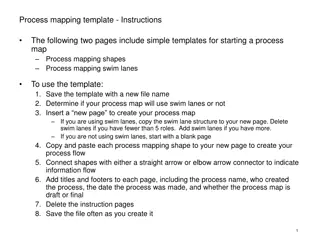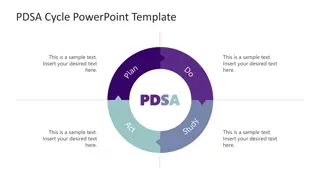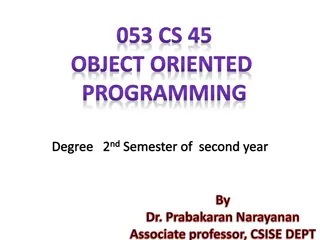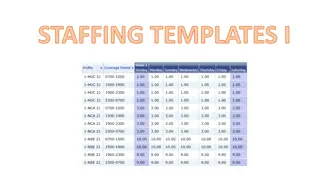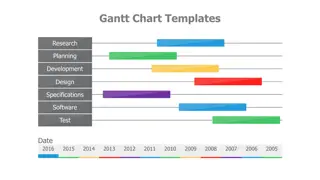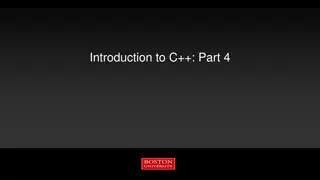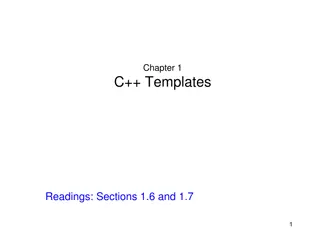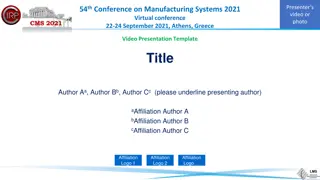Templates
Templates in C++ allow for the creation of generic pieces of code that can be parameterized by types, classes, and integer constants. They provide a powerful tool for creating reusable code and enable compile-time polymorphism. This text delves into the different aspects of templates, from template types to template instantiation and argument deduction, highlighting their importance and impact on code generation and performance.
Download Presentation

Please find below an Image/Link to download the presentation.
The content on the website is provided AS IS for your information and personal use only. It may not be sold, licensed, or shared on other websites without obtaining consent from the author.If you encounter any issues during the download, it is possible that the publisher has removed the file from their server.
You are allowed to download the files provided on this website for personal or commercial use, subject to the condition that they are used lawfully. All files are the property of their respective owners.
The content on the website is provided AS IS for your information and personal use only. It may not be sold, licensed, or shared on other websites without obtaining consent from the author.
E N D
Presentation Transcript
Templates A template is a generic declaration with compile-time formal arguments of these kinds: any type template< typename T> // also template< class T> [C++20] the type may be constrained using Concepts a list of any types (in a variadic template) template< typename ... TL> integral number (the actual argument must be a compile-time constant) template< std::size_t N> a list of integral numbers (in a variadic template) template< int ... NL> another class template (with the given template argument list) template< template< typename, std::size_t> class T> [C++17] the actual argument may also be a type template a pointer (the actual argument must be an address of a static variable/function) almost never used, functors work better template< const char * p, inf (*fp)(int,int)> A function/lambda with auto arguments is technically also a template void f(auto && x); template< typename T> void f(T && x);
Templates Template a generic piece of code parameterized by types, class/type templates, and integer constants Class templates Global classes Classes nested in other classes, including class templates template< typename T, std::size_t N> class array { /*...*/ }; Function templates Global functions Member functions, including constructors template< typename T> inline T max( T x, T y) { /*...*/ } Type templates [C++11] template< typename T> using array3 = std::array< T, 3>; Variable templates [C++14] Global variables and static data members inline needed when declared in .hpp template< typename T> inline factory_class<T> factory; Mostly used as global constants acting as compile-time functions on types template< typename T> inline constexpr std::size_t my_sizeof = sizeof(T); // usage: my_sizeof<double>
Templates Template instantiation Using the template with particular type and constant parameters Class, type, and variable templates: parameters specified explicitly std::array< int, 10> x; [C++17] Template argument deduction: Class template parameters may be deducted from initialization std::pair p = { "pi", 3.14 }; Function templates: parameters specified explicitly or implicitly Implicitly - derived by compiler from the types of value arguments int a, b, c; a = max( b, c); // calls max< int> Explicitly a = max< double>( b, 3.14); Mixed: Some (initial) arguments explicitly, the rest implicitly std::array< int, 5> v; x = std::get< 3>( v); // calls std::get< 3, std::array< int, 5>>
Templates and compilation Compilers [may] check template code when defined Without the knowledge of template arguments Syntactic hints from the author may be required Compilers generate code only when templates are instantiated Different instantiations do not share code It sometimes causes unwanted code size explosion There is no run-time support required for templates Code generated for templates is identical to non-templated equivalents There is no performance penalty for generic code Except that generic programming may encourage programmers to be lazy
Templates and compilation Implicit template instantiation When a class template specialization is referenced in context that requires a complete object type, or when a function template specialization is referenced in context that requires a function definition to exist the template is instantiated (the code for it is actually compiled) unless the template was already explicitly specialized or explicitly instantiated at link time, identical instantiations generated by different translation units are merged Instantiation of template member functions Instantiation of a class template doesn't instantiate any of its member functions unless they are also used The definition of a template must be visible at the point of implicit instantiation
Templates and compilation The definition of a template must be visible at its instantiation Classes and types The visibility of definition is required also in the non-template case Most class and type definitions must reside in header files Function templates (including non-template member functions of class templates etc.) The template visibility rule is equivalent to rules for inline functions Non-inline function templates are almost unusable Most function template definitions must reside in header files (and be inline) If a declaration only is visible, the compiler will not complain - it will generate a call but not the code of the function called the linker will complain In rare cases, the visibility rule may be silenced by explicit instantiation: Applicable only if all required argument combinations may be enumerated template int max<int>(int, int); // forces instantiation of max<int> template double max(double, double); // forces instantiation of max<double> template class X<int>; // forces instantiation of all member functions of X<int>
Templates Multiple templates with the same name Class templates: one "master" template template< typename T> class vector {/*...*/}; any number of specializations which override the master template partial specialization template< typename T, std::size_t n> class unique_ptr< T[n]> {/*...*/}; explicit specialization template<> class vector< bool> {/*...*/}; Function templates: any number of templates with the same name shared with non-templated functions Type and variable templates, concepts only one definition (which may refer to different specializations of a class template)
Writing templates Compiler needs hints from the programmer Dependent names have unknown meaning/contents template< typename T> class X { type names must be explicitly designated using U = typename T::B; typename U::D p; // U is also a dependent name using Q = typename Y<T>::C; void f() { T::D(); } // T::D is not a type explicit template instantiations must be explicitly designated bool g() { return 0 < T::template h<int>(); } int j() { return p.template k<3>(); } // type of p is a dependent name } members inherited from dependent classes must be explicitly designated template< typename T> class X : public T { const int K = T::B + 1; // B is not directly visible although inherited void f() { return this->a; } // a is not directly visible }






